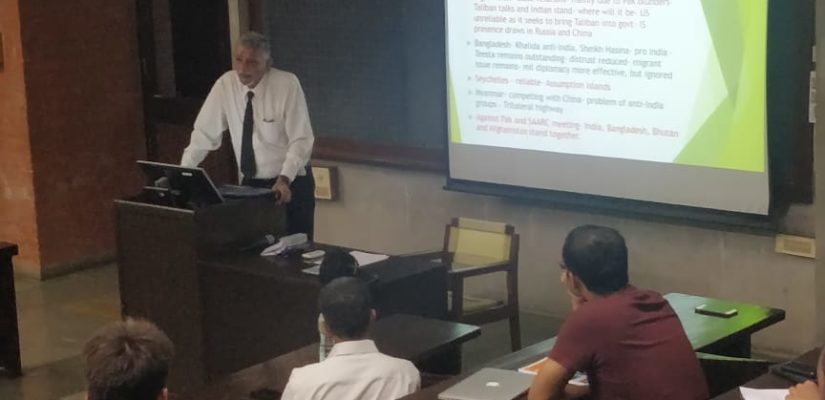
The destabilizing role of the Pak army News4masses 14 Feb 19
The destabilizing role of the Pak army News4masses 14 Feb 19
In a rare rebuke to the powerful Pak army, its supreme court prohibited them from engaging in political activities and directed the ISI to operate within the law. It gave this judgement when deciding on the 2017 Faizabad sit-in by the hard line TLP and other smaller groups. The bench also stated that the armed forces were prohibited from engaging in any kind of political activity, which includes supporting a party, faction or individual.
This twenty-day Faizabad protest had paralysed the twin cities of Rawalpindi and Islamabad. The army refused to be involved in evicting the protestors, instead brokered peace, forcing the government to accept all demands of the protestors. The signed agreement also conveyed thanks to the army chief for his mediation. When the protestors were moving out, post the final agreement, a serving army major general was seen on video, distributing Rs 1000 notes to each protestor.
It was evident that behind this protest was the hand of the ISI and the Pak army, who have for a long time been nurturing hard-line factions within the country and anti-India and Afghanistan group leaders. Even internally, its policies have harmed the nation and almost leading to a situation of chaos. The fact that it controls foreign policy towards India, US and Afghanistan as also censorship of its own media is already well established.
A recent article in the New York Times by the leader of the Pashtun Protection Movement (PTM), Mansoor Pashteen, gave details of how the Pak army has destabilized the region. The article was aptly headlined, ‘The military says Pashtuns are traitors. We just want our rights.’ In Pakistan, the editorial of the New York Times is published by Express Tribune. In this case, the paper published a blank space in place of this article. The reason, it is dangerous in Pak to be critical of the army. The dawn had experienced it earlier.
Pashteen states that the movement held multiple protests only to highlight their concerns to the government, however the response was intimidation and violence. The movement has been peaceful but notable for its verbal attacks on the army. The army spokesperson warned the movement of being critical of the army. Major General Asif Ghafoor stated in Dec 2018, ‘we realize their grief, their hardships, but they should not cross these lines.’ Those who participate are being charged with sedition.
The hard approach adopted by the army would never subdue the movement, instead stroke further anger and hatred. This movement could be the turning point in Pak history, leading to more such movements spread across the country. The responsibility of which would rest with the army’s highhanded and merciless approach.
Over the last few years, the army has been accused of cracking down on bloggers and journalists, who have even slightly been critical of their army. Most journalists who have experienced abductions by the ISI or its goons have either fled Pak or stopped writing. In Sindh too there are regular rallies demanding release of political activists and those who have abducted by the army and the rangers. This army action has reignited the Sindh freedom struggle.
It has worked in coordination with the supreme court to ensure that Nawaz Sharif, who was seeking to bring down the power of the army, was removed. Prior to elections, it forced other political parties to lower their tempo, threatening to bring its leaders to task, while promoting Imran Khan. International observers openly commented on an unlevelled playing field. One misstep by Imran, and in all probability, their foreign minister, Qureshi who missed being PM chair twice, would walk in.
In its present state of financial crises, where the government is struggling to make ends meet, the only share of the budget which the government does not possess the guts to check is the defence budget. This is solely because the army ensures that enmity with India remains, justifying its power remains untouched.
Internationally, the army’s support to anti-terror groups, Taliban, LeT and HM have led to the country being diplomatically isolated. The fact that Osama Bin Laden was discovered close to the Pak military academy made it evident to the world that the army had hidden him. It only added to Pak’s isolation, leaving it with the support of China.
Mounting pressure on Pak from the US, Saudi Arabia, UAE and other allies have forced the Pak army to change its stance and suddenly discover that it not only has influence over the Taliban but can also bring them to the bargaining table. The Taliban leadership which never existed on Pak soil has suddenly emerged. It is also seeking to meet with the Pak PM, an action which indicates Pak’s continued support to them. The world was aware of the realities, only Pak continued to lie.
The actions of the Pak army have brought the nation’s economy down. Bangladesh, which obtained freedom from Pak in 1971 has moved way ahead of Pak in development, GDP and per capita income. The FDI coming into Bangladesh is far higher than Pak, as also are its foreign exchange reserves. It needs no begging bowl. The interference by the Pak army is moving the nation down a dangerous road, compelling its leadership to move with a begging bowl to stave off a collapse.
The hold that the army has on the nation has ensured that there is no power to question its activities and control. The rare judgement by the supreme court would be ignored, as it is unimplementable. Who has the guts to force it? It has been issued and the matter closed. In the long run, it may only be movements spread across the country, which could force a change. Till then the Pak army would continue leading the nation down in every sphere.